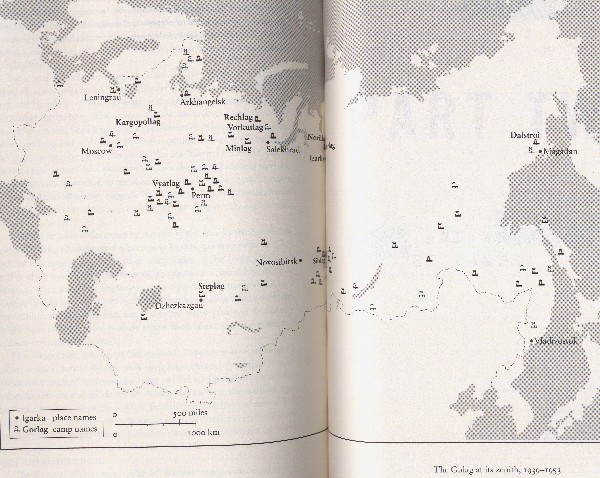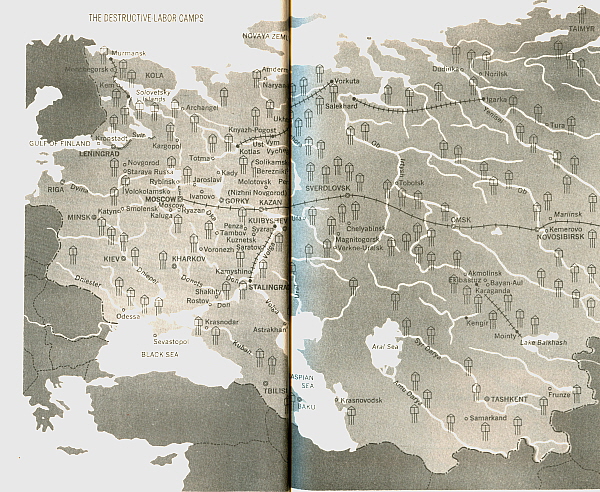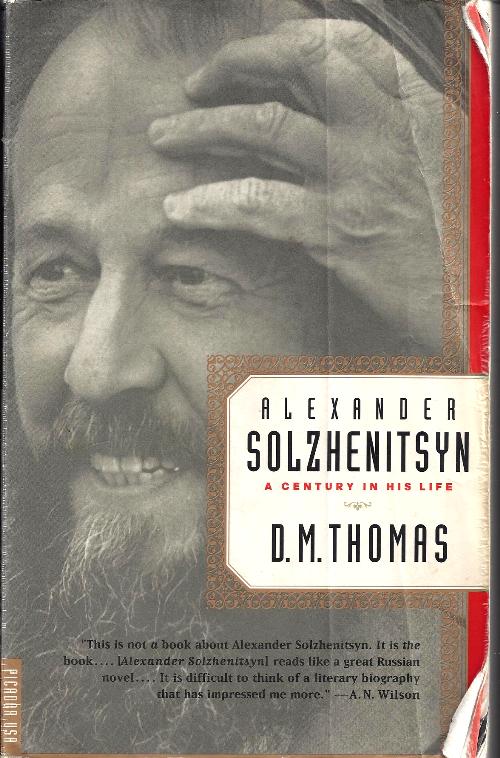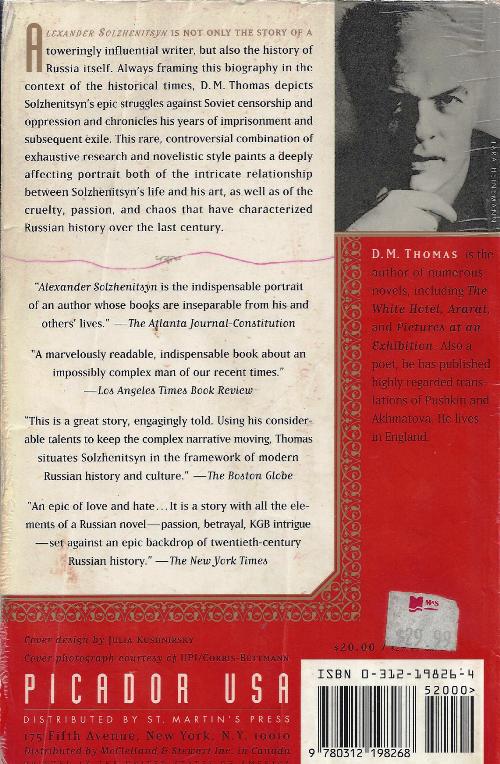Tribute to Solz.
Tribute to Solz
1 [Tribute]
2
[Tribute_solz]
3
[Tribute1]
4
[Tribute 2]
5
[Tribute 3]
6
[Tribute 4]
7
[Tribute 5]
8
[Solz1]
9 [Solz 2]
10 [Solz 3]
....
Alexander Solzhenitsyn, tác
giả các cuốn ‘Bán đảo Gulag' (the Gulag Archipelago) và ‘Một ngày
trong cuộc
đời Ivan Denisovich’ (One Day In The Life Of Ivan Denisovich), đã trở
về Nga
năm 1994...
BBC
Thú
thực Gấu không thể tưởng
tượng mấy anh Yankee mũi tẹt làm cho Bi Bi Xèo ngu dốt đến mức như thế
này!
Quần
đảo, Archipelago, biến
thành Bán đảo, Peninsula!
Chứng
tỏ, mấy anh này không
có một tí hiểu biết gì về bộ sách khổng lồ của Solz. Tất nhiên, chưa
hề đọc,
ngoài ra, còn mù tịt, về hệ thống trại tù của Liên Xô. Chúng như những
hòn đảo
nhỏ, rải rác khắp nước Nga, lập thành một quần
đảo.
Thảm
thật!


(1) Lấy từ Gulag a history, của Anne Applebaum
(2). Từ Quần đảo Gulag, của Solz, bản rút gọn
Gulag, a history
Cái gọi là văn
chương Miền
Nam, trước 1975, ngày càng lộ ra như một toàn thể, không một nhà văn
nào có thể
bị chia cắt ra khỏi một nhà văn nào, trừ những anh VC nằm cùng, tất
nhiên.
Gấu đọc D.M. Thomas,
viết về
tiểu sử Solzhenitsyn, và ngộ ra điều trên.


Alexander Solzhenitsyn: Thế kỷ ở trong ta.
Trong bài tựa, D.M. Thomas viết, Solz đã giúp trong cái chuyện hạ gục nền độc tài vĩ đại nhất thế giới, kể từ trước tới nay, ngoài ra còn dậy cho Tây phương biết, Cái Ác đầy đủ của nó khủng khiếp ghê rợn là dường nào, its full horror. Không nhà văn nào của thế kỷ 20 có một tầm ảnh hưởng như ông trong lịch sử.
Nhưng câu chuyện của ông không phải của chỉ đơn độc một thế kỷ. Khi Alexander Tvardovsky, chủ biên tờ Novy Mir cho người vời nhà văn vô danh tới, để thảo luận về bản thảo Một ngày trong đời Ivan Denisovich, trên đường tới gặp, Solz bèn ghé Quảng trường Strastnaya, đứng bên dưới tượng Pushkin, chơi một pô hình, một phần, mong thi sĩ phù hộ [support: hỗ trợ], một phần, hứa hẹn: Đàn em biết con đường phải đi theo. Và sẽ đếch thèm xin thuận buồm xuôi gió! [I knew the path I must follow and would not stray from it].Một thứ cầu nguyện, theo Thomas.
Không phải theo kiểu thường nhân ghé đứng chụp hình kế bên Shakespeare, vừa tưởng niệm vừa hưởng tí vinh dự: Solz nhìn ở Pushkin như người đồng thời của mình.
Nhưng cái cử chỉ, hành động ghé tượng Pushkin đã khiến Thomas có một vision về cuốn sách mình sẽ viết. Nó làm ông nhớ đến bài thơ hách xì xằng của Pushkin, Kỵ Sĩ Đồng, 1833.
Ui chao, lạ làm sao, nó làm Gấu nhớ tượng Đức Thánh Trần và ngón tay của Người chỉ ra cửa biển Vũng Tầu!
Một linh hồn lưu vong
Không hiểu ngày nay, ở quê hương Việt Nam thân yêu của chúng ta, còn có những đồng bào hong hóng chờ tới giờ phát thanh bằng tiếng Việt của một VOA, một BBC?… Những người dân Nga đã có thời trải qua những giờ phút như vậy, và Solzhenitsyn hiểu rằng, những đồng bào của ông, đâu phải ai cũng có cơ may, hoặc có đủ can đảm, cầm trong tay một ấn bản in lén lút tác phẩm của ông. Họ biết về Hy Vọng Dù Không Còn Hy Vọng, biết những sự thực nóng bỏng ở trong những tác phẩm của ông, những cuốn tiểu thuyết, và nhất là tác phẩm mang tính tài liệu lớn lao của ông, Quần Đảo Gulag: họ biết chúng, qua những tiếng còn tiếng mất, của những làn sóng ngắn các đài phát thanh Tây Phương.
The Old Days
PROLOGUE
I ASKED A RETIRED KGB COLONEL, NOW GIVEN THE JOB OF IM-proving Russia's image abroad, what image he would choose to represent the beginning of the Bolshevik era. We were at a Helsinki hotel, overlooking the frozen sea. Some mutual friends had said he knew something about KGB attempts on Solzhenitsyn's life; he was disappointingly vague on that subject, but enjoyed talking with me about Russian history and art over a bottle of vodka.
"What image?" he mused, gazing out through the icy window at the Gulf of Finland. A few weeks before, a car ferry, the Estonia, had sunk in heavy seas, with a thousand deaths. It had seemed, we had agreed, an apt image for the end of Communism: a tiny crack, widening swiftly through a weight of water, capsizing the unbalanced boat. "I would choose," he replied at last, "a moment described in Nathan Milstein's autobiography. As a symbolic beginning, you understand. Milstein was a music student in Petersburg during the First World War. And he writes that, in 1916, in the winter, he was walking along the Moika Canal. In front of the Yousoupov Palace he heard agitated voices, and saw people craning to look over the parapet into the frozen river. So Milstein looked down too, and saw some of the ice was broken, and there, the water had pink swirls in it. People around him were shouting, 'Rasputin! Bastard! Serve him right!' Milstein realized the pinkish swirls were the blood of Rasputin-one of the most powerful men in the empire. Imagine it: hurrying along a frozen canal-a day in December like this one, perhaps late for a violin lesson-and you see Rasputin's blood! ... Well, I've seen lots of blood, even shed quite a lot of it. ... But anyway, if I were a writer, or maybe a filmmaker, that's how I'd start: looking down at broken ice and seeing swirls of blood. Like a dream ... "
Beginning this biography, I see the old KGB man and the swirl of Rasputin's blood. The single most important aspect of Solzhenitsyn's life is that he was born a year after the Bolshevik Revolution. He is "October's twin." Other great Russian writers who suffered intensely under Communism, but who spent their childhood and youth in normal bourgeois circumstances under tsarism, can refer to the beginning of their lives with a lucid definiteness. Anna Akhmatova: "I was born in the same year [1889] as Charlie A Chaplin, Tolstoy's Kreuzer Sonata, the Eiffel Tower, and, it seems, T. S. Eliot." (1). Boris Pasternak: "I was born in 1890 in Moscow, on the 29th of January according to the Old Calendar, in Lyzhin's house opposite the Seminary in Oruzheiny Street. Surprisingly, something has remained in my memory of my walks in autumn with my wet-nurse in the Seminary park-sodden paths heaped with fallen leaves, ponds and artificial hills, the painted Seminary railings, the noisy games and fights of the seminarists during their recreation. " (2)
The lighthearted juxtaposition of Chaplin and Eliot in the former, and the rich sensuous detail in the latter, have no counterpart in Solzhenitsyn's brief references to his childhood. No other writer has used his adult life as material to the degree Solzhenitsyn has done, yet from the very beginnings one finds a kind of Dickensian fog and murk. Perhaps one consequence of this was that, while he seemed to develop a very sure sense of identity, he continually explored different fictional self-portrayals-Nerzhin in The First Circle, Kostoglotov in Cancer Ward, Vorotyntsev in August 1914-as if the misty beginnings make him need to keep looking for himself.
His self-representations are of the fully grown man-soldier, writer, zek;* not, however, husband or lover, with rare exceptions; and for any "portrait of the artist as a young man" or as a child we look in vain. Instead of any clear statement of where and when he was born, there is a sense of confused, almost mythic, birth. It could not have been other, for a child born in the turbulence of 1918, and already fatherless.
It was, after all, the time of facelessness. In Akhmatova's horrifying image of the Revolution:
As though,
in night's terrible mirror
Man, raving,
denied his image
And tried to
disappear. ... (3)
The human
face disappeared, and also its divine image. In the classical world a
slave was
called aprosopos,
"faceless"; literally, one who cannot be seen. The
Bolsheviks gloried in facelessness.
It is
inconceivable that Solzhenitsyn could have written, "I was born in the
same year as Nicolae Ceausescu, Kurt Waldheim, and Ella Fitzgerald, on
11
December 1918, in Kislovodsk. ... "
Out of that violent beginning, he became the last in a great line of poets and novelists that began with Pushkin. They were more than writers; they were, since they all lived under authoritarian or tyrannical regimes, "another government," in Solzhenitsyn's phrase: cherished by their fellow Russians because they felt a special responsibility to be truthful.
Solzhenitsyn's long life is unique and extraordinary. He has embraced almost the totality of his country's terrible century. Born amid chaos; caught up, as a schoolboy, in the heavily propagandized excitement of the first Bolshevik years; then a front-line Red Army soldier; the shock of arrest, for writing imprudent letters criticizing Stalin; the horror of a Lubyanka interrogation, followed by the camps and "perpetual exile"; release from it in the milder years of Khrushchev; sudden fame as the author of One Day in the Life of Ivan Denisovich, which devastatingly brought what had only been whispered about into the open; then, losing favor, becoming a dissident of incredible fearlessness, and enterprise; publication of The Gulag Archipelago, his exposure of the whole Soviet tyranny from Lenin on; rearrest and enforced exile from his country-the first Russian to suffer this fate since Trotsky; quarrels with his hosts in the West; eventual return to a Russia where, for very different reasons, he found it necessary to be a kind of dissident still. ...
Solzhenitsyn helped to bring down the greatest tyranny the world has seen, besides educating the West as to its full horror. No other writer of the twentieth century has had sue an influence on history.
But his story is not of one century alone. When Alexander Tvardovsky, editor of the journal Novy Mir, sent for the unknown writer to discuss the manuscript of Ivan Denisovich, Solzhenitsyn paused beneath Pushkin's statue in Strastnaya Square, "partly to beg for his support, and partly to promise that I knew the path I must follow and would not stray from it. It was a sort of prayer." (4). This is much more than the respectful homage an English or American novelist might pay to a bust of Shakespeare: Solzhenitsyn saw Pushkin as his contemporary.
When I was thinking hard and long about whether to accept an invitation to write this biography, I had a dream in which I was in the small Cornish town of my childhood. Suddenly floodwaters rose, and I found myself swept along by them. At first it was quite exhilarating-even though I can't swim; I expected to round a corner and see my old school; I could cling on to a wall. But when the billows swept me round the corner, I saw, in place of the expected road and school, a flat sea of turbulent water. Fear gripped me.
Along with many other personal associations, the dream was obviously warning me I might drown .if I entered this unfamiliar territory: I am a novelist and poet, not a biographer. I might drown under the horrifying weight of a densely packed life like Solzhenitsyn's, or under his wrath, since he hates unapproved biographers as much as he hated the Soviet censors.
Bill I chose to see the dream in a more positive light. I could see the flood as pointing in the direction of one of the great seminal works of Russian literature, Pushkin's The Bronze Horseman (1833). In that great narrative poem, a flood sweeps over St. Pertersbug and devastates the life of "my poor, poor Yevgeni”, a humble clerk. Driven mad, Yevgeni shakes his fist at the famous equestrian statue of Peter the Great, crying, “All rigid, you wonder-worker, just you wait!” Peter was the egoistical monster who had ordered the creation of a capital city on marshy Finnish ground. He thought nothing of the thousands of lives his dream would cost in the construction of it.
But the Russians still have an admiration for Peter-just as too many of them still admire Stalin and would like to see him back. Any reference in a literary work of the Bolshevik era to The Bronze Horseman can immediately be interpreted as a comment on Stalinism. Russian life and literature is a country, with limitless intercommunications-not a history. "Russian literature," wrote the scholar and translator Max: Hayward, is "a single enterprise in which no one writer can be separated from another. Each one of them is best viewed through the many-sided prism constituted by all of them taken together. A later generation consciously takes up the motifs of its predecessors, responds to them, echoes them, and sometimes consummates them in the light of the intervening historical experience.?"
This seems to me the only worthwhile kind of "writers' union"; and to write a life of Solzhenitsyn is inevitably to write about a century-or perhaps
two. I have felt myself to be a visitor in the "country of Russian literature" since I first inadequately learned Russian during two years of military service
in the 1950s. Being reminded by the dream of that great fellowship of Russian writers, for whom two centuries are but a single moment, helped to persuade me to yield to the flood, for good or ill. Another persuasion was that Solzhenitsyn's life has been a fantastic and inspiring story; but one so complicated by politics that it is difficult to see the wood for the plethora of trees. It challenged me to use my fictive experience to tell a story that is truly stranger than fiction.
D.M. Thomas


Comments
Post a Comment